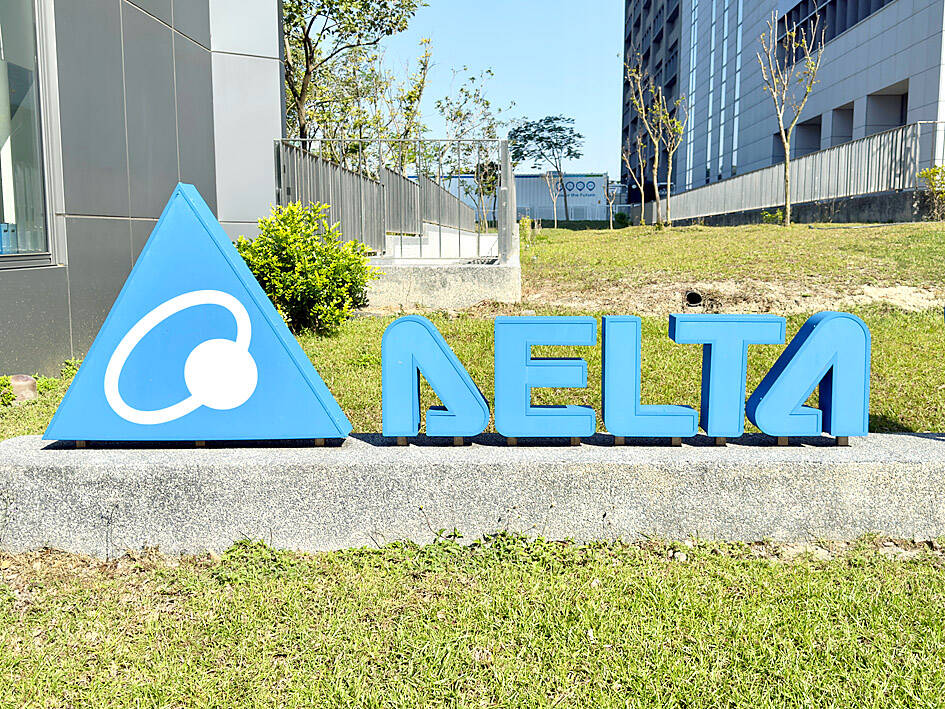Power supply and electronic components maker Delta Electronics Inc (台達電) maintained its forecast that revenue in the second half of the year would exceed the first half’s NT$242.9 billion (US$7.9 billion), after third-quarter sales hit a record high, a company official told the Taipei Times by telephone on Monday.
Delta on Friday reported sales of NT$150.32 billion for last quarter, up 21.2 percent from the previous quarter and 34 percent from a year earlier.
The figure beat Yuanta Securities Investment Consulting Co’s (元大投顧) forecast of NT$140.32 billion and a market consensus estimate of NT$138.24 billion.

Photo: Fang Wei-chieh, Taipei Times
The company’s strong performance last quarter was supported by stable shipments of power and heat-dissipation products to artificial intelligence (AI) server customers, said the official, who declined to be named.
It also came as demand for power electronics and liquid-to-air heat dissipation racks in the quarter exceeded expectations, after overheating issues during the assembly of Nvidia Corp’s GB200 servers were resolved, the company said.
Nvidia’s GB200 servers entered mass production in the second quarter, and Delta mainly supplies in-rack coolant distribution units, liquid-to-air busbars, high-voltage direct-current systems and grid-to-chip infrastructure solutions for the GB200 model, the company said.
Revenue in the first nine months of the year was NT$393.27 billion, up 28.1 percent from the same period last year, company data showed.
Delta is developing power supply products for an 800-volt high-voltage direct-current (DC) structure and a +/-400-volt DC system, with mass production scheduled to start in the second half of next year.
Regarding future power distribution architecture, a centralized power rack design is likely to become a major trend for newly built hyperscale data centers, the official said.
While some customers might still opt for power shelves, the company is able to supply both power racks and shelf products going forward, depending on demand, the official added.
As Nvidia’s future-generation superchip platform, Vera Rubin, which is set to launch in the second half of next year, would require more than three times the 120 kilowatts used by the GB200 model, it would likely need a power-rack design, Delta said earlier.

Taiwan’s rapidly aging population is fueling a sharp increase in homes occupied solely by elderly people, a trend that is reshaping the nation’s housing market and social fabric, real-estate brokers said yesterday. About 850,000 residences were occupied by elderly people in the first quarter, including 655,000 that housed only one resident, the Ministry of the Interior said. The figures have nearly doubled from a decade earlier, Great Home Realty Co (大家房屋) said, as people aged 65 and older now make up 20.8 percent of the population. “The so-called silver tsunami represents more than just a demographic shift — it could fundamentally redefine the

The US government on Wednesday sanctioned more than two dozen companies in China, Turkey and the United Arab Emirates, including offshoots of a US chip firm, accusing the businesses of providing illicit support to Iran’s military or proxies. The US Department of Commerce included two subsidiaries of US-based chip distributor Arrow Electronics Inc (艾睿電子) on its so-called entity list published on the federal register for facilitating purchases by Iran’s proxies of US tech. Arrow spokesman John Hourigan said that the subsidiaries have been operating in full compliance with US export control regulations and his company is discussing with the US Bureau of

Businesses across the global semiconductor supply chain are bracing themselves for disruptions from an escalating trade war, after China imposed curbs on rare earth mineral exports and the US responded with additional tariffs and restrictions on software sales to the Asian nation. China’s restrictions, the most targeted move yet to limit supplies of rare earth materials, represent the first major attempt by Beijing to exercise long-arm jurisdiction over foreign companies to target the semiconductor industry, threatening to stall the chips powering the artificial intelligence (AI) boom. They prompted US President Donald Trump on Friday to announce that he would impose an additional

Pegatron Corp (和碩), a key assembler of Apple Inc’s iPhones, on Thursday reported a 12.3 percent year-on-year decline in revenue for last quarter to NT$257.86 billion (US$8.44 billion), but it expects revenue to improve in the second half on traditional holiday demand. The fourth quarter is usually the peak season for its communications products, a company official said on condition of anonymity. As Apple released its new iPhone 17 series early last month, sales in the communications segment rose sequentially last month, the official said. Shipments to Apple have been stable and in line with earlier expectations, they said. Pegatron shipped 2.4 million notebook